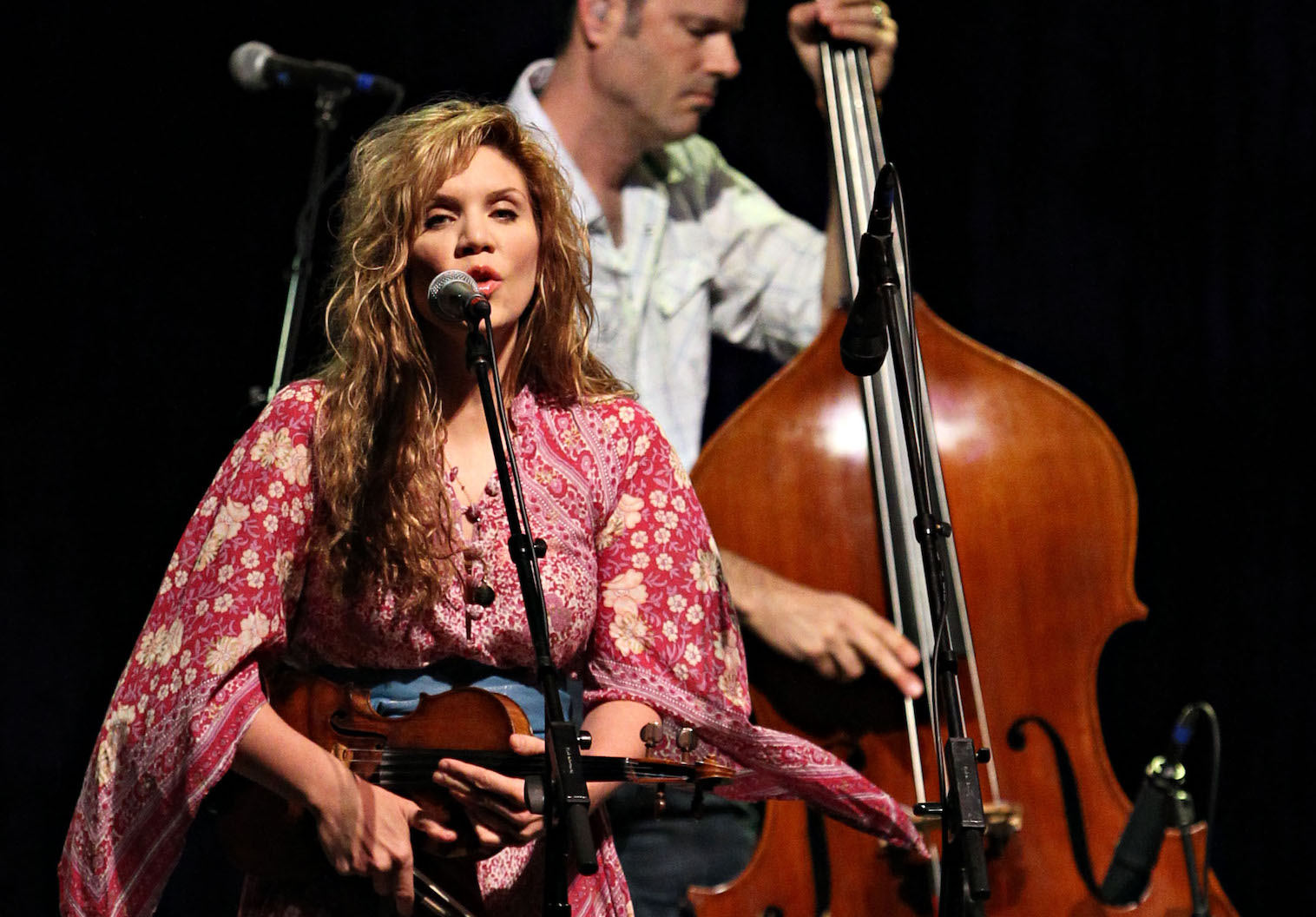In a CBS Sunday Morning interview for their new album Raise the Roof, the follow up to the 2009 Grammy-winning album of the year Raising Sand, Robert Plant and Alison Krauss talked about their origins.
“I come from the land of the ice and snow,” Plant said in his yobbo English accent, quoting the opening line of Led Zeppelin’s Immigrant Song.
“And me from the land of corn and beans,” Krauss interjected, in a Midland twang that is not quite Nashville, but not Chicago, either.
The land of corn and beans is Central Illinois, where Krauss was born (in Decatur) and began fiddling (at the Champaign County Fair). A winner of 27 Grammy Awards — the fourth-most all-time — Krauss is the pride and joy of Illinois, you bet. Her face and her fiddle are on the facade of the Abraham Lincoln Presidential Museum in Springfield, advertising “State of Sound: A World of Music from Illinois,” an exhibit running until January 23.
The museum, which once paid $6 million for a hat reputed to have been worn by Abraham Lincoln, has collected some precious artifacts from Illinois musicians. Steve Goodman’s Cubs jacket. Miles Davis’s trumpet. Derrick Carter’s mixer. Dan Fogelberg’s acoustic guitar, perhaps the one on which he wrote “Same Old Lang Syne,” a romantic ballad about hooking up with an old girlfriend at a Peoria liquor store. A Rick Nielsen double-necked guitar — probably easy for him to part with, since he has 400 at home in Rockford.
The exhibit covers folk (Carl Sandburg, John Prine), blues (Muddy Waters, Willie Dixon), rap (Common, Kanye West), country, and alternative (The Smashing Pumpkins, Liz Phair). “State of Sound” makes a case for Illinois as a musical melting pot, the “fulcrum of America,” REO Speedwagon singer Kevin Cronin calls his home state in a podcast interview, available on Spotify. As the state that, more than any other, encompasses North and South in its 400-mile run from Chicago to Cairo, one of Illinois’s great musical innovations is melding those two great American sounds: rock and roll and country. Specifically, musicians from the Illinois part of Illinois — Downstate, where people say “I’m from Illinois,” not “I’m from Chicago.”
Raising Sand, the collaboration between the co-author of “Stairway to Heaven” and the bluegrass queen of the Grand Ole Opry, sold more than 1 million copies and introduced Krauss to Plant’s rock audience. “Gone Gone Gone (Done Moved On),” the album’s biggest hit, starts out as a country torch song, and ends up electric. Krauss, who grew up in a college town, has a more metropolitan sensibility than her fellow Illinois country musician, Brett Eldredge of Paris. She also showed her inclination to jump between genres with a cover of James Taylor’s “Carolina In My Mind.”
Besides its Grammys, Raising Sand won Album of the Year at the Americana Music Honors & Awards. That is a genre which owes its popularity — some say its existence — to another Illinois band, Belleville’s Uncle Tupelo. In his book It’s Just the Normal Noises: Marcus, Guralnick, No Depression and the Mystery of Americana Music, Timothy Gray wrote that “the Americana movement was sparked by Uncle Tupelo’s debut album, released in 1990.” That album was No Depression, which also inspired the magazine No Depression: A Journal of Roots Music, and the alt country movement, whose most popular label was Chicago’s Bloodshot Records.
Related Content
In the 1990s, “Chicago, for the second time in its civic history, became a bastion of country music,” wrote Pitchfork’s Jeremy D. Lawson. “Thanks in part to British art-punks the Mekons, the launch of Bloodshot Records, and the continued success of anything Jeff Tweedy touched; ‘insurgent country’ and ‘alt-country’ became Chicago-based sobriquets.”
After leaving Uncle Tupelo, Tweedy moved to Chicago and founded Wilco, immediately releasing a pair of country-flavored albums, A.M. and Being There. In his State of Sound podcast interview, Tweedy was asked about founding the alt-country genre.
“I’ve always felt compelled to push back a little bit, and argue the case that country music has always been a part of rock and roll, that we weren’t really doing anything that different,” he responded. “The genres were getting more specified at that time, it would seem like. The Rolling Stones had plenty of country-sounding songs, and they would never be called anything other than a rock and roll band. Even bands later than that, bands like X, they had songs that had a country element.”
X just furthers the argument that Illinois is a place where rock and country mate. On its debut album, Los Angeles, the band combined punk and country into a sound that became known as psychobilly. Although X formed in L.A., three of its four members were from Illinois: John Doe of Decatur, Billy Zoom of Savanna, and Exene Cervenka of Mokena.
Even Kevin Cronin, who’s from Oak Lawn, talked about the challenges of combining his rock and roll sensibilities with the country background of REO Speedwagon’s guitarist, Gary Richrath of Pekin. REO formed at the University of Illinois. While no one considers REO a country-rock band, their rural, Lower Midwestern vibe was an inspiration to Columbus, Ohio’s Rascal Flatts — a band they’ve toured with. As Slate once observed, “the mournful catch in singer Gary LeVox’s voice recalls no one so much as Kevin Cronin, the leader of an earlier era’s Big Ten ballad powerhouse, REO Speedwagon of Champaign, Ill.”
“State of Sound” doesn’t devote a whole lot of attention to alt-country’s Illinois origins (although there is a Mekons poster). The exhibit mostly focuses on traditional musical genres — blues, gospel, folk, country, jazz, rock, rap. In doing so, though, “State of Sound” makes the point that all this music coexists in our most diverse, most American of states, always ready to be combined into something brand new.



